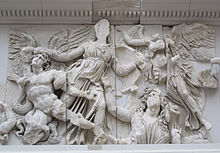
In Greek mythology, Alcyoneus or Alkyoneus (/ælˈsaɪ.əˌnjuːs/; Ancient Greek: Ἀλκυονεύς, romanized: Alkyoneús) was a traditional opponent of the hero Heracles. He was usually considered to be one of the Gigantes (Giants), the offspring of Gaia born from the blood of the castrated Uranus.[1]
According to the mythographer Apollodorus, Alcyoneus' confrontation with Heracles was part of the Gigantomachy, the cosmic battle of the Giants with the Olympian gods. In Apollodorus' account Alcyoneus and Porphyrion were the greatest of the Giants, and Alcyoneus was immortal as long as he was in his native land. When Heracles shot Alcyoneus with an arrow, Alcyoneus fell to the ground but then began to revive, so on the advice of Athena, Heracles dragged Alcyoneus out of his homeland where Alcyoneus then died.[2]
For the poet Pindar, Heracles' battle with Alcyoneus (whom he calls a herdsman), and the Gigantomachy were separate events.
In some accounts Alcyoneus caused the Gigantomachy by stealing the cattle of Helios.[3] Vase paintings suggest a version of the story in which Heracles encounters a sleeping Alcyoneus.
His seven daughters are the Alkyonides.
- ^ Gantz, pp. 419–421, 445–450; Hard, p. 89. Smith has separate entries for the opponent of Heracles, mentioned by Pindar: Alcyoneus 1., and the Giant: Alcyoneus 2.. For the birth of the Gigantes see Hesiod, Theogony 185. Hyginus, Fabulae Preface gives Tartarus as the father of the Giants.
- ^ Apollodorus, 1.6.1.
- ^ Scholiast to Pindar Isthmian 6.47; Gantz, p. 419.